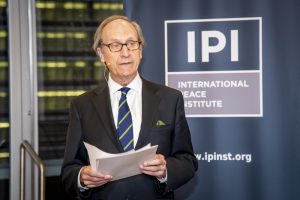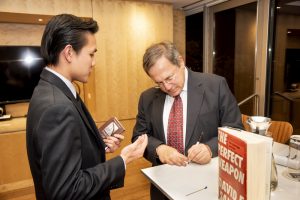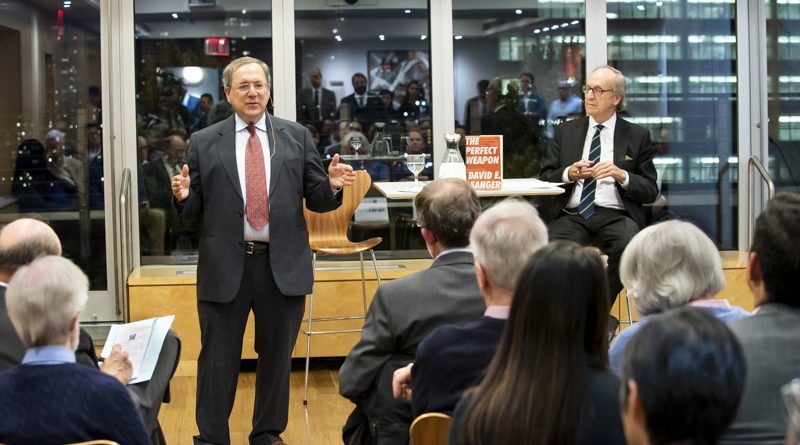School of Diplomacy co-hosts International Peace Institutes’ Distinguished Author Series
By Tien Phan
Staff Writer
On October 18, 2018, the School of Diplomacy and International Relations co-hosted the International Peace Institute’s (IPI) Distinguished Author Series. The event’s guest speaker was David E. Sanger, national security correspondent for the New York Times and author of “The Perfect Weapon: War, Sabotage, and Fear of the Cyber Age.”
The event took place in IPI’s New York headquarters, which overlook the East River and the United Nations headquarters. Warren Hoge, Senior Adviser for External Relations at IPI, moderated the event. Himself a New York Times veteran, Mr. Hoge shared the stage with Mr. Sanger to discuss the reality of warfare in the cyber age.
Against the backdrop of a crisp fall sunset, Mr. Sanger described the changes in warfare from the nuclear age to the cyber age; emphasizing his belief that the Trump administration is willfully ignorant to the number-one threat to America’s national security.

Mr. Sanger, with a dash of wit and humor, explained the folly of traditional warfare. A physical conflict with a nuclear-capable country like Iran, he argued, would most definitely be harmful to both sides. This thinking also extends to traditional warfare with other nuclear-capable powers.
Upon coming to this realization, the United States shifted its focus to what Mr. Sanger calls a “perfect weapon.” Due to its inability to fight another land war following the Iraq war, the Bush administration opted for a controversial, subtle, and shockingly precise, tool: cyberwarfare.
Mr. Sanger, a veteran journalist who has spent almost 38 years at the New York Times, explained cyberwarfare’s benefit over nuclear warfare. Unlike cyber weapons, nuclear bombs operate on a tremendous scale. A nuclear bomb’s destructive capabilities are so large that the decision to use them is only reserved for a grave threat to the U.S.’ survival.
Due to the doctrine of mutually assured destruction – the idea that in a nuclear war both the attacker and the defender will be annihilated – it is improbable that any state will have 1-on-1 nuclear confrontation with the U.S.
Cyberwarfare however, can paralyze and even destabilize an entire country while utilizing much less resources – in theory, all it would take would be a few talented computer hackers. Far from the realm of science fiction, the U.S. funneled millions of dollars into project “Nitro Zeus,” a program designed to do just that: cripple an entire country’s electrical grid with a comprehensive cyber-attack as a precursor to military invasion.

While nuclear weapons cause incalculable human casualties that would inevitably escalate any conflict to a world war, a cyberattack is infinitely more precise. Additionally, there seems to be little repercussion for the use of cyber-attacks.
If North Korean soldiers had gone on a tour of Sony’s Hollywood studios and decided to bomb their headquarters, the U.S. would have undoubtedly retaliated with military force, explained Mr. Sanger. However, he went on to say, when North Korean spies hacked Sony’s servers and melted down 70 percent of their computers, the U.S. only instituted more sanctions that were barely felt among the slew of existing sanctions.
According to Mr. Sanger, countries do not view the threat of cyberwarfare on par with military conflict, opting to view it as espionage. As a result, more and more states are turning to cyberwarfare. A decade ago, only nine states had cyber security mechanisms, said Mr. Sanger, now that number has almost quadrupled.
As the threat of cyber conflicts escalates – both because of the increase in participants and because of the capabilities of those participants – a solution seems more unlikely. A large part of the problem, Mr. Sanger argues, is the U.S. itself.
Specifically, the issue is the U.S.’ unwillingness to condemn other nations for cyber security attacks; which it refers to as “hacking” when they are committed by adversaries but views them as “cyber operations” when the U.S. is the one committing them. Essentially, the U.S. cannot condemn other nations for attacks that they themselves commit regularly.

Mr. Sanger, when asked by Mr. Hoge about his optimism, described what he believes could be a solution to devastating cyber-attacks. A way to de-escalate the situation, he argued, could be implementing some form of a “digital Geneva Convention” to regulate the use of cyber-attacks. Much in the vein of the original Geneva Conventions, the proposed plan would protect civilians who are not actively taking part in hostilities.
Chloe Whitewater, a current senior Diplomacy major, noted that even though cyber conflicts seem, on the surface, less harmful than nuclear conflicts, they should not be taken lightly. Ms. Whitewater argued that due to the world’s increased dependence on technology, we are more vulnerable every day.
“This change in threat should be a focus of the global community – the United States included. In addition, the capability of cyber manipulation to have psychological impacts on our society is [a] threat that should not be underestimated,” Ms. Whitewater added.

Dr. Courtney Smith, Senior Associate Dean of the School of Diplomacy and International Relations, was thrilled to have such a significant turnout of students at the event. Dr. Smith, a longtime friend of Mr. Hoge, emphasized the importance of how close the university is to New York City and the resulting opportunities.
As the evening drew to a close, students parted with more awareness of the conflict going on around them every day. Mr. Sanger emphasized how removed policymakers are from the issue, stating that many congressmen don’t even have computers in their offices.
By becoming aware of the issue’s intricacy, tomorrow’s policy makers can arm themselves with the knowledge to tackle this mounting threat.
Reported by Tien Phan, edited by Felipe Bueno.

